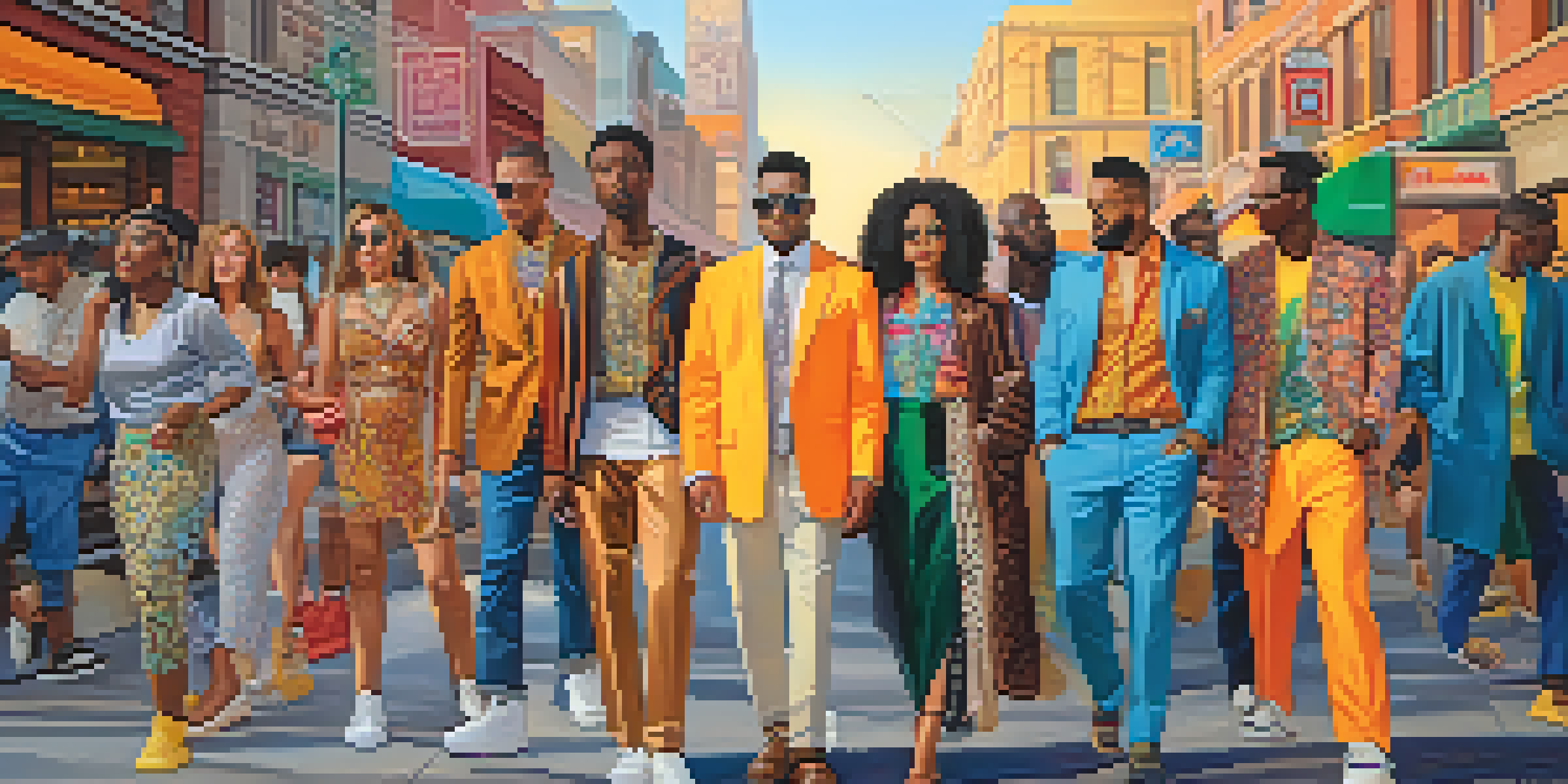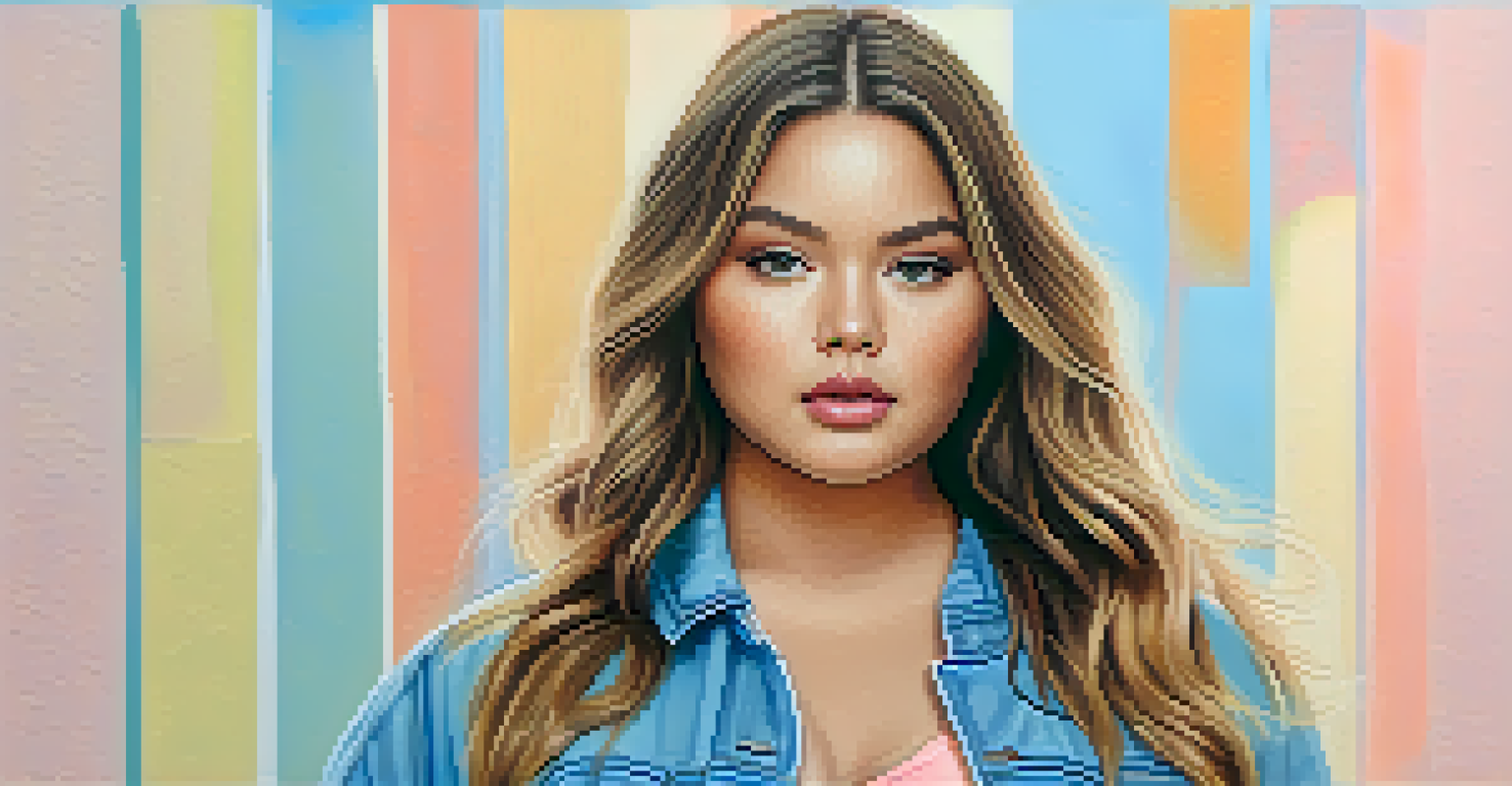The Impact of Fashion Trends on Mental Health Perception

Understanding the Connection Between Fashion and Mental Health
Fashion has always been a reflection of society, but its impact on mental health is often overlooked. The way we dress can influence not only how we feel about ourselves but also how others perceive us. For instance, wearing bright colors might boost your mood, while darker tones can evoke feelings of sadness or anxiety.
Fashion is the armor to survive the reality of everyday life.
Research has shown that our clothing choices can significantly affect our self-esteem. When someone feels confident in their outfit, they are likely to carry themselves differently, influencing their interactions. This ripple effect can enhance or diminish one's mental state throughout the day.
Moreover, societal standards set by fashion trends can create unrealistic expectations, leading to feelings of inadequacy. When people compare themselves to influencers or celebrities, they may experience anxiety or depression if they feel they don't measure up.
The Role of Social Media in Shaping Fashion Trends
Social media platforms have revolutionized the way fashion trends emerge and spread, often at an unprecedented speed. Influencers and celebrities showcase the latest styles, making them instantly accessible to millions. While this can inspire creativity, it can also pressure individuals to conform to ever-changing standards.

As users scroll through curated feeds, they may develop a skewed perception of reality. The constant barrage of 'perfect' images can trigger feelings of jealousy or inadequacy, contributing to mental health struggles. It's essential to recognize that these portrayals often omit the messy, unfiltered aspects of life.
Fashion Affects Mental Health
Our clothing choices can significantly influence our self-esteem and overall mental well-being.
Furthermore, social media can foster a sense of community around specific fashion trends. While this can be uplifting, it can also lead to groupthink, where individuals feel compelled to adopt a certain style to fit in, potentially impacting their mental well-being.
How Fashion Trends Impact Body Image Perception
Fashion trends often dictate what is considered 'beautiful' or 'acceptable' in society, influencing body image perception significantly. For example, the shift toward body positivity has challenged traditional beauty standards, allowing for more diverse representations. This movement can empower individuals to embrace their bodies, improving mental health.
Style is a way to say who you are without having to speak.
Conversely, trends that emphasize a specific body type can lead to negative self-image for those who don't conform. When people feel pressured to fit into a certain mold, it can result in unhealthy behaviors, including extreme dieting or body shaming. This cycle can be detrimental to one's mental well-being.
It's important to foster conversations about body image within the fashion industry. By highlighting diverse body types and promoting inclusivity, we can help alleviate the mental health burdens associated with unrealistic standards.
The Therapeutic Potential of Fashion and Personal Style
Fashion can serve as a form of self-expression and therapy for many individuals. Creating unique outfits allows people to showcase their personalities, providing an outlet for emotions. This creative process can enhance mental well-being, as it encourages self-discovery and confidence.
Dressing up for an occasion, even if it's just for oneself, can uplift mood and provide a sense of normalcy. It can be a simple act that transforms how one feels inside, acting as a mood booster when life gets tough. In this way, fashion becomes a tool for empowerment.
Social Media Shapes Fashion Trends
The rapid spread of fashion trends on social media can create pressure to conform, impacting mental health.
Moreover, engaging with fashion through hobbies like sewing or upcycling can also promote mindfulness. These activities require focus and creativity, helping individuals to reduce anxiety and reconnect with themselves.
Cultural Influences on Fashion and Mental Health
Cultural backgrounds play a significant role in shaping fashion trends and their subsequent impact on mental health. Traditional clothing often carries deep meanings and can evoke a sense of pride and belonging. Celebrating these cultural identities can positively influence mental well-being.
However, the clash between modern fashion trends and traditional attire can create a conflict for some individuals. This struggle to balance cultural heritage with contemporary styles can lead to feelings of alienation or depression, highlighting the importance of understanding these dynamics.
Promoting cultural appreciation in the fashion industry can foster inclusivity and mental well-being. When people feel represented and valued in fashion, it can enhance their self-esteem and overall mental health.
Fashion Industry's Responsibility Towards Mental Health
The fashion industry holds significant power in shaping societal perceptions, and with that comes responsibility. Brands can choose to promote positive messaging around mental health and body image, impacting how individuals feel about themselves. By featuring diverse models and promoting inclusivity, they can foster a more positive environment.
Furthermore, brands can advocate for mental health awareness through campaigns and collaborations. By partnering with mental health organizations, they can raise awareness and provide resources for those struggling. This approach not only benefits the community but also enhances brand loyalty.
Cultural Identity Influences Fashion
Balancing traditional attire with modern styles can affect individuals' sense of belonging and mental health.
Ultimately, the industry has an opportunity to shift narratives around beauty and self-worth. By prioritizing mental health, fashion can evolve into a more supportive and empowering space for everyone.
Future Trends: Fashion's Evolving Relationship with Mental Health
As we move forward, the relationship between fashion and mental health will likely continue to evolve. With growing awareness of mental health issues, there is a shift towards prioritizing well-being in fashion choices. This trend could lead to more brands embracing ethical practices and promoting mental health initiatives.
Innovations in sustainable fashion can also play a role in improving mental health perceptions. As consumers become more conscious of their choices, the act of supporting sustainable brands can foster a sense of purpose and fulfillment, positively impacting mental well-being.

Ultimately, the future of fashion holds the potential for a more mindful approach that considers the mental health of both consumers and creators. Embracing this evolution can pave the way for a healthier relationship with fashion and self-image.